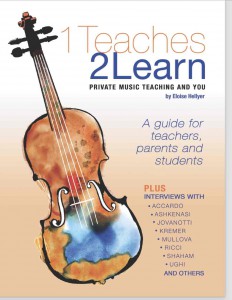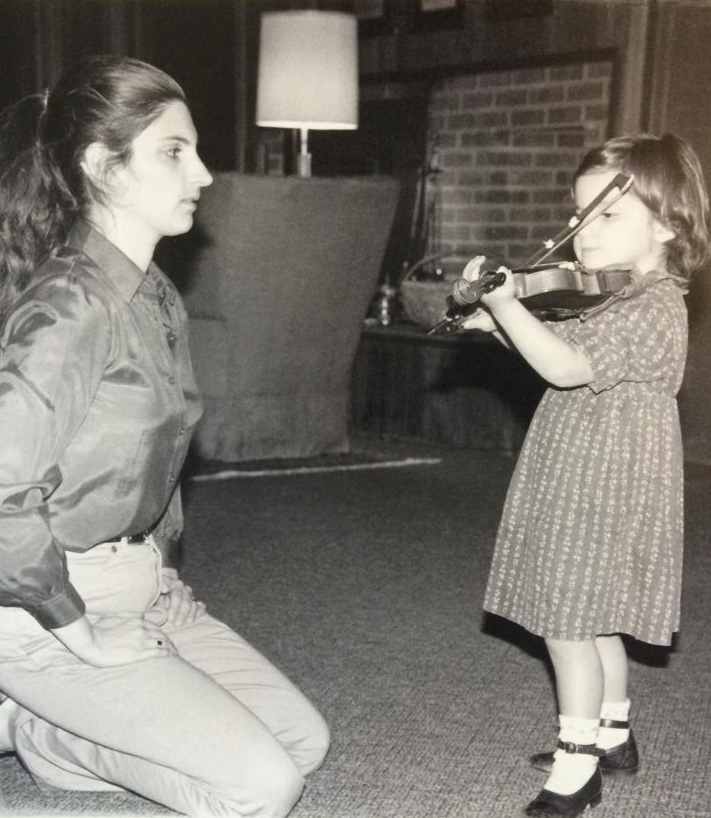The Care and Feeding of Prodigies
Sooner or later almost every teacher gets a super talented student. While a teacher may initially get very excited about such a student, certain difficulties may soon reveal themselves. A prodigy can have one mental maturity level, another and different emotional maturity level all packaged in the body of a small child (a different physical maturity level). You may have to deal with a child who is mentally ten years old, emotionally six and physically four, for example, who may be capable of great things if you can keep all the above in mind and also deal with his frequently strong character.
Teaching any child is is an enormous responsibility but a prodigy is often an even bigger challenge as you have to keep the child playing until his various aspects catch up to his talent, without giving that talent much importance. This requires an enormous amount of long vision and self control on the part of the teacher. The biggest favor you can do a talented child, is to give him a certain humility – that his talent is a gift and not to let his ego grab his talent and take credit for it. He must be praised for what he does, but not be lauded for his talents, i.e., his good fortune. It is like telling a child how wonderful he is because he has rich parents or because he is physically attractive. Your student will get lots of fuss from relatives, friends, and practically anyone who hears him play. He needs you to keep his feet firmly on the ground. His and his parents’ – it’s so easy for parents to get over-excited and ambitious when they become aware that they may have a genius on their hands. Teachers can exert a lot of influence here and must use it wisely.
Why? Because prodigies grow up. And then what? One example of poor prodigy management is that many of them quit when they become adults because they no longer feel special. I will never forget a super-talented young girl I once met who told me she was 16 when I asked her age. Her mother later told me that the girl was going to be 17 in two weeks. What normal teenager wouldn’t tell you that she would be 17 very soon, or indeed that she already was 17? To her, becoming an adult meant becoming a violinist just like everyone else – no longer a prodigy and no more fanfare. A child should want to grow up, not want to remain small so she will continue to feel special. A special child may have the potential to become a special adult if handled properly, but if the child gets the understanding from her teachers, parents or surroundings that she is special because she is talented and small, then there will be trouble sooner or later.
The great teacher Elaine Richey once said, “A child may be precocious at the age of five but no one Is precocious at the age of twenty-five.” Precocious or prodigious children are not stupid – they know they have something beyond normal. The trick is not to let them identify with their precocity which may well mean keeping them off YouTube and avoiding making a three ring circus out of them: “I played it (the Tschaikovsky concerto) when I was 14 – this makes me sad,” was the comment of one grown up violinist on seeing a YouTube video of a ten year old playing that concerto. Instead of being happy that she could play such a difficult concerto at the age of fourteen, which is quite a feat, she is now unhappy that she feels she has been one-upped by a ten year old. But when they are both fifty will anyone know the difference? Is there any guarantee that playing a difficult concerto at an early age produces a better musician as an adult?
It seems there is not. Please consider an article on the APS website* about a speech Malcolm Gladwell gave on prodigies, where he discussed the fact that precocity is not a predictor of future success, even with musicians. That a musical child prodigy may mimic adult artists very well but may not be able to make the switch to his own artistry when he grows up. That prodigies are child genius learners who do not always turn into adult genius doers.
Or even this article in the “Telegraph”** about a researcher who has followed various child prodigies and who found that the adult results are often quite different from what one might expect. Of the 210 child prodigies studied by Joan Freeman, author of the book; “Gifted Lives: What Happens When Gifted Children Grow Up,” only six went on to important careers. Those are pretty bad odds.
Or the following article in “The Columbia Chronicle” *** which discusses the neurology of prodigies and states:
“But most young musicians Booth (an impresario) works with do not end up becoming working professionals, in part because the music industry is flooded with young talent but also because their priorities change as they enter high school, he said.
Life is not easy for many child prodigies; advancing into a professional sphere can damage their ability to connect with their peers, and many choose between socializing or practicing their skill as they age. Others can become socially isolated—graduating college at 16 does not guarantee that researching in a lab or performing when they reach adulthood will be effortless.
All this would suggest that it behooves us teachers to remind ourselves and the prodigy’s parents that if a child has a marked talent for one thing, he would probably be very good at something else as well. Therefore, his whole education should be attended to so the child has choices as a grown-up. It is my belief that it is essential to have “Plan B” no matter how talented a child is. What if our prodigy has an injury that stops his pursuing a career? A careless slip of a knife or a playground accident that anyone else might laugh off can stop a career in its tracks. And this can happen at any age. I encourage all of my career bound students to think about this. Some of them have tears in their eyes when I suggest they consider developing the possibility of a career outside of performing, but I would be remiss in my responsibility if I didn’t do this. Life in music has gotten to be so, if not too, difficult and competitive no matter how great the talent.
The important thing is to keep perspective. When a violinist is thirty, is anyone going to know she was fourteen, fifteen, ten, or even six years old when she learned Tschaikovsky? Is anyone even going to care? It is our obligation to our students to make sure that they grow up to be complete and competent musicians, as well as competent human beings in general. And that means teaching the whole student, not just her talent. That means remembering that a prodigy is by definition a talented child, i.e., a work in progress, which means we have the responsibiity of guiding both her and her parents so that the result is a whole and well-adjusted adult human being – who still loves music and plays it, whatever her final career choice may be.
Post author: Eloise Hellyer
* http://www.psychologicalscience.org/observer/the-myth-of-prodigy-and-why-it-matters#.WRL0gBh7H_8
** http://www.telegraph.co.uk/education/8028543/Gifted-children-no-more-likely-to-succeed.html
*** http://www.columbiachronicle.com/arts_and_culture/article_f13abf7a-a672-11e3-85a0-0017a43b2370.html
Share this:
Buy it on www.sharmusic.com - eBook format, avaliable worldwide, paperback in North America
COPYRIGHT
ABOUT
A music teacher’s thoughts and observations on the teaching and the study of a musical instrument, hoping to be of help to parents, students and teachers.
PHOTO
AWARDED TOP 25 VIOLIN BLOG
CATEGORIES
TAGS
ARCHIVES
-
Agosto 2022
Agosto 2023
Agosto 2024
April 2015
April 2016
April 2017
April 2019
April 2020
Aprile 2022
Aprile 2023
Aprile 2024
August 2014
August 2015
August 2016
August 2017
August 2018
August 2019
August 2021
December 2014
December 2015
December 2016
December 2017
December 2018
December 2019
December 2020
Dicembre 2022
Dicembre 2023
Dicembre 2024
Febbraio 2022
Febbraio 2023
Febbraio 2024
February 2015
February 2016
February 2018
February 2019
February 2020
February 2021
Gennaio 2022
Gennaio 2023
Gennaio 2024
Giugno 2022
Giugno 2022
Giugno 2023
Giugno 2024
January 2015
January 2016
January 2017
January 2018
January 2019
January 2020
July 2015
July 2017
July 2019
June 2016
June 2017
June 2018
June 2019
June 2020
June 2021
Luglio 2022
Luglio 2023
Luglio 2024
Maggio 2022
Maggio 2023
Maggio 2024
March 2015
March 2016
March 2017
March 2018
March 2019
March 2020
March 2021
Marzo 2022
Marzo 2023
Marzo 2024
May 2015
May 2016
May 2018
May 2019
May 2020
November 2014
November 2015
November 2016
November 2017
November 2018
November 2019
November 2021
Novembre 2022
Novembre 2023
Novembre 2024
October 2014
October 2015
October 2017
October 2018
October 2019
October 2020
October 2021
Ottobre 2022
Ottobre 2023
Ottobre 2024
September 2014
September 2015
September 2016
September 2018
September 2019
September 2020
September 2021
Settembre 2022
Settembre 2023
Settembre 2024
RECENT POSTS
Terry G and Me, or Terry Gilliam on Where (or What) Practicing the Piano Will Get You…
The Teaching We Don’t Do Is More Important Than We Think
Overwhelmingness or What Teaching and Motherhood* Have in Common
Cellphone Serenity
How to Build Your Reputation – the Kind You Want
Desperate Times, Desperate Measures. Or How to Deal With Your Strong-Willed Stubborn Student and Survive
“Why Does My Teacher Get So Frustrated?” Letter to a Perplexed Student
Mount Rush-no-more….And How to Get There
Realizzato con VelociBuilder - Another Project By: Marketing:Start! - Privacy Policy




